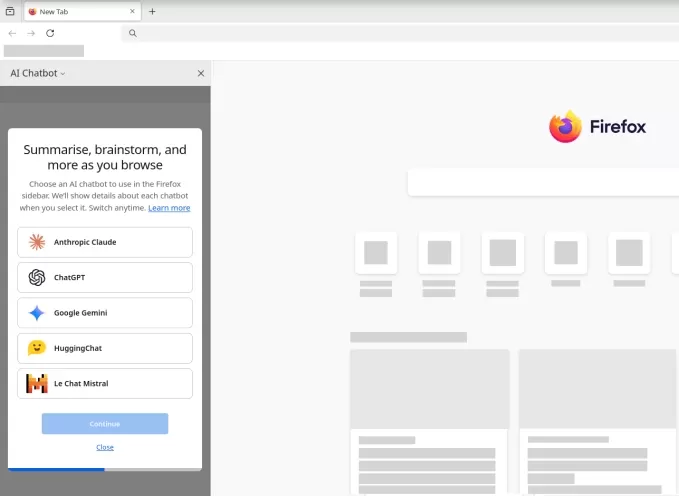Mozilla Clarifies: Not Using User Data for AI Amid Terms Backlash
Mozilla recently faced significant backlash over the new Terms of Use for its Firefox web browser, which some users felt used overly broad language that seemed to grant the company rights to any data entered or uploaded by users. In response, Mozilla clarified that these new terms do not represent a change in their data usage practices but are intended to formalize and clarify the user agreement.
On Wednesday, Mozilla rolled out the new Terms of Use along with an updated Privacy Notice for Firefox, aiming to enhance transparency about user rights and permissions, and to provide a clearer explanation of their data practices. "We tried to make these easy to read and understand — there shouldn’t be any surprises in how we operate or how our product works," the company stated in a blog post.
However, the initial rollout caused confusion, prompting Mozilla to update the blog post to explicitly state that the terms do not give Mozilla ownership of user data or the right to use it beyond what is outlined in the Privacy Notice.
The new terms included a statement that particularly alarmed users: "When you upload or input information through Firefox, you hereby grant us a nonexclusive, royalty-free, worldwide license to use that information to help you navigate, experience, and interact with online content as you indicate with your use of Firefox." Critics, including Brendan Eich, co-founder and CEO of rival browser maker Brave Software, expressed strong concerns about the broadness of this language. Eich suggested on X that Mozilla might be pivoting its business model to monetize user data for AI and other purposes.
In response to these concerns, TechCrunch sought clarification from Mozilla about whether the new terms indicated that user data was being shared with AI companies or advertisers. Mozilla confirmed that the Privacy Notice still governs the use of AI features, and that content data is not sent to Mozilla or third parties. They also emphasized that any data shared with advertisers is de-identified.
Brandon Borrman, Mozilla’s VP of Communications, told TechCrunch, "These changes are not driven by a desire by Mozilla to use people’s data for AI or sell it to advertisers. As it says in the Terms of Use, we ask for permission from the user to use their data to operate Firefox ‘as you indicate with your use of Firefox.’ This means that our ability to use data is still limited by what we disclose in the Privacy Notice."
The Privacy Notice specifies that Firefox may collect technical and interaction data related to the use of AI chatbots. If users opt into using third-party AI chatbots with Firefox, the third party will handle their data according to their own policies. Other AI features in Firefox operate locally on users' devices and do not transmit content data to Mozilla or elsewhere.

Image Credits:Mozilla/Firefox
Mozilla also clarified its advertising practices, noting that it does sell advertising within Firefox to fund browser development. "It’s part of Mozilla’s focus to build privacy-preserving ads products that improve best practices across the industry," a spokesperson said. They added that any data collected and shared with advertising partners is done so on a de-identified or aggregated basis, as outlined in the Privacy Notice. Users can opt out of data processing for advertising purposes by disabling a setting related to "technical and interaction data" on both desktop and mobile devices.
Mozilla further explained the choice of certain terms in the agreement. The term "nonexclusive" was used to indicate that Mozilla does not seek an exclusive license to user data, allowing users to use their data elsewhere. "Royalty-free" was chosen because Firefox is a free service, and neither Mozilla nor the user should owe money for data handling. "Worldwide" reflects Firefox's global availability and its role in accessing the global internet.
Despite Mozilla's efforts to clarify that the new policies do not change how they use data, the broad language used in the terms may continue to raise concerns among users, potentially driving some to switch to other browsers. This could be challenging for Firefox, which currently holds only a 2.54% share of the global browser market, trailing behind Chrome (67%), Safari (17.95%), and Edge (5.2%).
Updated after publication to attribute the statement more accurately to Mozilla’s VP of Comms Brandon Borrman, rather than the spokesperson who had emailed the statement, Kenya Friend-Daniel.
Related article
 Flower Labs launches a new service that automatically switches from local to cloud AI
Flower Labs, a startup backed by Y Combinator, unveiled a sneak peek of their new distributed cloud platform, Flower Intelligence, on Tuesday. This platform is designed to serve AI models, and it's already being used by Mozilla to enhance their upcoming Assist summarization add-on for the Thunderbir
Flower Labs launches a new service that automatically switches from local to cloud AI
Flower Labs, a startup backed by Y Combinator, unveiled a sneak peek of their new distributed cloud platform, Flower Intelligence, on Tuesday. This platform is designed to serve AI models, and it's already being used by Mozilla to enhance their upcoming Assist summarization add-on for the Thunderbir
 Trump Prioritizes AI Growth Over Regulation in Race to Outpace China
The Trump administration unveiled its landmark AI Action Plan on Wednesday, marking a decisive break from the Biden administration's risk-averse AI policies. The ambitious blueprint prioritizes aggressive infrastructure development, sweeping regulato
Trump Prioritizes AI Growth Over Regulation in Race to Outpace China
The Trump administration unveiled its landmark AI Action Plan on Wednesday, marking a decisive break from the Biden administration's risk-averse AI policies. The ambitious blueprint prioritizes aggressive infrastructure development, sweeping regulato
 Seeking Faith and Purpose in an Age of Skepticism
In our modern age of scientific inquiry and critical thinking, maintaining spiritual faith often feels like walking against the tide. Many struggle to reconcile timeless beliefs with contemporary skepticism, leaving them longing for deeper meaning. T
Comments (42)
0/200
Seeking Faith and Purpose in an Age of Skepticism
In our modern age of scientific inquiry and critical thinking, maintaining spiritual faith often feels like walking against the tide. Many struggle to reconcile timeless beliefs with contemporary skepticism, leaving them longing for deeper meaning. T
Comments (42)
0/200
![JuanScott]() JuanScott
JuanScott
 August 24, 2025 at 9:01:17 PM EDT
August 24, 2025 at 9:01:17 PM EDT
Mozilla's clarification is a relief, but why did they word it so vaguely in the first place? 🤔 Sounds like they need a better legal team to avoid scaring users.


 0
0
![KeithSmith]() KeithSmith
KeithSmith
 August 4, 2025 at 2:01:00 AM EDT
August 4, 2025 at 2:01:00 AM EDT
Wow, Mozilla really dodged a bullet with that vague Terms of Use wording! Glad they clarified no user data is being used for AI training. Transparency is key, but they gotta be more careful with how they phrase things—scared me for a sec thinking my browsing history was about to train some AI overlord! 😅


 0
0
![EdwardBaker]() EdwardBaker
EdwardBaker
 April 23, 2025 at 9:46:16 PM EDT
April 23, 2025 at 9:46:16 PM EDT
Mozilla's clarification on not using user data for AI was a relief, but the initial scare was real. Glad they cleared it up, but it's a reminder to always read the fine print! 🔍📜


 0
0
![CharlesJohnson]() CharlesJohnson
CharlesJohnson
 April 23, 2025 at 1:09:43 AM EDT
April 23, 2025 at 1:09:43 AM EDT
La aclaración de Mozilla sobre no usar datos de usuarios para IA fue un alivio, pero el susto inicial fue real. Me alegra que lo hayan aclarado, pero es un recordatorio para siempre leer la letra pequeña! 🔍📜


 0
0
![CharlesLee]() CharlesLee
CharlesLee
 April 20, 2025 at 6:26:35 AM EDT
April 20, 2025 at 6:26:35 AM EDT
A clarificação da Mozilla sobre não usar dados de usuários para IA foi um alívio, mas o susto inicial foi real. Fico feliz que eles tenham esclarecido, mas é um lembrete para sempre ler a letra pequena! 🔍📜


 0
0
![LarryMartin]() LarryMartin
LarryMartin
 April 18, 2025 at 1:39:10 AM EDT
April 18, 2025 at 1:39:10 AM EDT
Mozilla가 사용자 데이터를 AI에 사용하지 않는다고 명확히 한 것은 안심이 되었지만, 처음의 혼란은 정말 무서웠어요. 설명해줘서 다행이지만, 항상 작은 글씨를 읽어야 한다는 것을 상기시켜 주었네요! 🔍📜


 0
0
Mozilla recently faced significant backlash over the new Terms of Use for its Firefox web browser, which some users felt used overly broad language that seemed to grant the company rights to any data entered or uploaded by users. In response, Mozilla clarified that these new terms do not represent a change in their data usage practices but are intended to formalize and clarify the user agreement.
On Wednesday, Mozilla rolled out the new Terms of Use along with an updated Privacy Notice for Firefox, aiming to enhance transparency about user rights and permissions, and to provide a clearer explanation of their data practices. "We tried to make these easy to read and understand — there shouldn’t be any surprises in how we operate or how our product works," the company stated in a blog post.
However, the initial rollout caused confusion, prompting Mozilla to update the blog post to explicitly state that the terms do not give Mozilla ownership of user data or the right to use it beyond what is outlined in the Privacy Notice.
The new terms included a statement that particularly alarmed users: "When you upload or input information through Firefox, you hereby grant us a nonexclusive, royalty-free, worldwide license to use that information to help you navigate, experience, and interact with online content as you indicate with your use of Firefox." Critics, including Brendan Eich, co-founder and CEO of rival browser maker Brave Software, expressed strong concerns about the broadness of this language. Eich suggested on X that Mozilla might be pivoting its business model to monetize user data for AI and other purposes.
In response to these concerns, TechCrunch sought clarification from Mozilla about whether the new terms indicated that user data was being shared with AI companies or advertisers. Mozilla confirmed that the Privacy Notice still governs the use of AI features, and that content data is not sent to Mozilla or third parties. They also emphasized that any data shared with advertisers is de-identified.
Brandon Borrman, Mozilla’s VP of Communications, told TechCrunch, "These changes are not driven by a desire by Mozilla to use people’s data for AI or sell it to advertisers. As it says in the Terms of Use, we ask for permission from the user to use their data to operate Firefox ‘as you indicate with your use of Firefox.’ This means that our ability to use data is still limited by what we disclose in the Privacy Notice."
The Privacy Notice specifies that Firefox may collect technical and interaction data related to the use of AI chatbots. If users opt into using third-party AI chatbots with Firefox, the third party will handle their data according to their own policies. Other AI features in Firefox operate locally on users' devices and do not transmit content data to Mozilla or elsewhere.

Mozilla also clarified its advertising practices, noting that it does sell advertising within Firefox to fund browser development. "It’s part of Mozilla’s focus to build privacy-preserving ads products that improve best practices across the industry," a spokesperson said. They added that any data collected and shared with advertising partners is done so on a de-identified or aggregated basis, as outlined in the Privacy Notice. Users can opt out of data processing for advertising purposes by disabling a setting related to "technical and interaction data" on both desktop and mobile devices.
Mozilla further explained the choice of certain terms in the agreement. The term "nonexclusive" was used to indicate that Mozilla does not seek an exclusive license to user data, allowing users to use their data elsewhere. "Royalty-free" was chosen because Firefox is a free service, and neither Mozilla nor the user should owe money for data handling. "Worldwide" reflects Firefox's global availability and its role in accessing the global internet.
Despite Mozilla's efforts to clarify that the new policies do not change how they use data, the broad language used in the terms may continue to raise concerns among users, potentially driving some to switch to other browsers. This could be challenging for Firefox, which currently holds only a 2.54% share of the global browser market, trailing behind Chrome (67%), Safari (17.95%), and Edge (5.2%).
Updated after publication to attribute the statement more accurately to Mozilla’s VP of Comms Brandon Borrman, rather than the spokesperson who had emailed the statement, Kenya Friend-Daniel.
 Flower Labs launches a new service that automatically switches from local to cloud AI
Flower Labs, a startup backed by Y Combinator, unveiled a sneak peek of their new distributed cloud platform, Flower Intelligence, on Tuesday. This platform is designed to serve AI models, and it's already being used by Mozilla to enhance their upcoming Assist summarization add-on for the Thunderbir
Flower Labs launches a new service that automatically switches from local to cloud AI
Flower Labs, a startup backed by Y Combinator, unveiled a sneak peek of their new distributed cloud platform, Flower Intelligence, on Tuesday. This platform is designed to serve AI models, and it's already being used by Mozilla to enhance their upcoming Assist summarization add-on for the Thunderbir
 Trump Prioritizes AI Growth Over Regulation in Race to Outpace China
The Trump administration unveiled its landmark AI Action Plan on Wednesday, marking a decisive break from the Biden administration's risk-averse AI policies. The ambitious blueprint prioritizes aggressive infrastructure development, sweeping regulato
Trump Prioritizes AI Growth Over Regulation in Race to Outpace China
The Trump administration unveiled its landmark AI Action Plan on Wednesday, marking a decisive break from the Biden administration's risk-averse AI policies. The ambitious blueprint prioritizes aggressive infrastructure development, sweeping regulato
 Seeking Faith and Purpose in an Age of Skepticism
In our modern age of scientific inquiry and critical thinking, maintaining spiritual faith often feels like walking against the tide. Many struggle to reconcile timeless beliefs with contemporary skepticism, leaving them longing for deeper meaning. T
Seeking Faith and Purpose in an Age of Skepticism
In our modern age of scientific inquiry and critical thinking, maintaining spiritual faith often feels like walking against the tide. Many struggle to reconcile timeless beliefs with contemporary skepticism, leaving them longing for deeper meaning. T
 August 24, 2025 at 9:01:17 PM EDT
August 24, 2025 at 9:01:17 PM EDT
Mozilla's clarification is a relief, but why did they word it so vaguely in the first place? 🤔 Sounds like they need a better legal team to avoid scaring users.


 0
0
 August 4, 2025 at 2:01:00 AM EDT
August 4, 2025 at 2:01:00 AM EDT
Wow, Mozilla really dodged a bullet with that vague Terms of Use wording! Glad they clarified no user data is being used for AI training. Transparency is key, but they gotta be more careful with how they phrase things—scared me for a sec thinking my browsing history was about to train some AI overlord! 😅


 0
0
 April 23, 2025 at 9:46:16 PM EDT
April 23, 2025 at 9:46:16 PM EDT
Mozilla's clarification on not using user data for AI was a relief, but the initial scare was real. Glad they cleared it up, but it's a reminder to always read the fine print! 🔍📜


 0
0
 April 23, 2025 at 1:09:43 AM EDT
April 23, 2025 at 1:09:43 AM EDT
La aclaración de Mozilla sobre no usar datos de usuarios para IA fue un alivio, pero el susto inicial fue real. Me alegra que lo hayan aclarado, pero es un recordatorio para siempre leer la letra pequeña! 🔍📜


 0
0
 April 20, 2025 at 6:26:35 AM EDT
April 20, 2025 at 6:26:35 AM EDT
A clarificação da Mozilla sobre não usar dados de usuários para IA foi um alívio, mas o susto inicial foi real. Fico feliz que eles tenham esclarecido, mas é um lembrete para sempre ler a letra pequena! 🔍📜


 0
0
 April 18, 2025 at 1:39:10 AM EDT
April 18, 2025 at 1:39:10 AM EDT
Mozilla가 사용자 데이터를 AI에 사용하지 않는다고 명확히 한 것은 안심이 되었지만, 처음의 혼란은 정말 무서웠어요. 설명해줘서 다행이지만, 항상 작은 글씨를 읽어야 한다는 것을 상기시켜 주었네요! 🔍📜


 0
0





























